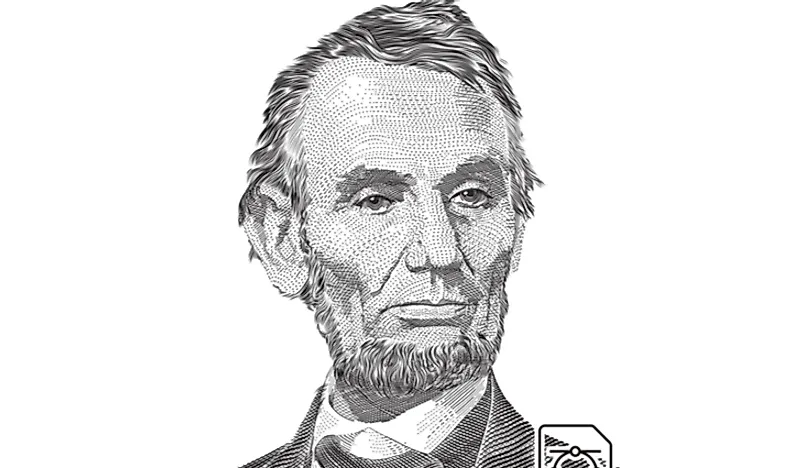Abraham Lincoln – 16th President

Abraham Lincoln was the 16th President of the United States of America. During his term, the United States was engulfed in its bloody Civil War. He is best known for directing the victory of the Union forces in the war, and he notably called for the abolition of slavery and reunification of the country.
Early Life
Abraham Lincoln was said to have been born in a log cabin at Sinking Springs Farm, in Hodgenville, Kentucky. He had two siblings: Sarah and Thomas. He grew up in the area containing what were then the most rapidly expanding Western Frontier states of the early 19th Century: Kentucky, Indiana, and Illinois. He was the second child of Thomas and Nancy Lincoln. Thomas Lincoln descended from a family of 17th Century British immigrants with roots in New England. His family gradually moved to the Western territories of the fledgling new US in the 18th century.
Abraham received a limited scope of formal education throughout his childhood. However, he was an avid reader, who followed up on his own with whatever information he received from occasional schooling from itinerant teachers. He did attend three schools, but his total days enrolled wouldn't even add up to a single year.
He worked first on his father's farm and as a storekeeper in his late teens. At the age of 22, he worked along with some of his friends as boat hands on flatboats that transported goods from Illinois to New Orleans. It was in New Orleans that he witnessed slavery for the first time. Lincoln later wrote to his family that he had abolitionist leanings, and the experiences at New Orleans in 1831 would leave lasting impressions on his beliefs for life.
Early Political Career
Eyewitness accounts of people who saw Lincoln in his formative years testified to his keen interest in matters of governance from a very early age. At the age of 23, he ran for the Illinois General Assembly, on a platform comprised of grassroots local issues as planks. He promised increased freedom and security for trade, and improvements in extant transportation facilities. During the same time, he enrolled for the Illinois Militia to participate in the short, but sanguinary, anti-Native American conflict called the Black Hawk's War, though he ultimately did not have to take part in any live combat.
Lincoln's second attempt at being elected to the Illinois General Assembly proved successful, when he ran as a member of the now dissolved Whig Party. In this new capacity, he gained a reputation for being a very honest legislator. His rhetorical skill was perceived to be phenomenal, both among his friends and rivals. He was subsequently re-elected to the Illinois General assembly for 4 successive terms, and during the same time he self-instructed himself regarding law and embarked on a highly successful legal career. In 1846, Lincoln was elected to the US House of Representatives. Keeping his promise not to run for a second term in Congress, he returned to Springfield, Illinois in the late 1840s to resume his legal practice there.
The Making of a President
It was the promulgation of the Kansas-Nebraska Act of 1854 which brought Lincoln back to politics. The Act potentially overrode the Missouri Compromise of 1820, which sought to restrict slavery north of Parallel 36° 30' North. He engaged in a series of highly publicized debates with the chief advocate for the act, Stephen A. Douglas, in the 1858 Elections for an Illinois Senate seat, in which he lost narrowly to Douglas. Despite the loss, his espousal here against the further expansion of slavery galvanized his base within the newly formed Republican party. In the 1860 US Presidential Election, Lincoln was chosen to be the presidential candidate of the new party, and he swept all the northern states to garner a significant majority in a tripartite contest.
His election to the Presidential office drew hostile reactions from the pro-slavery Southern states, who in turn threatened to secede from United States, and ultimately did so. The ensuing civil war between the Northern Unionist states and the newly formed pro-slavery Confederacy was waged for over 4 years, and remains the bloodiest conflict in American history in terms of American casualties. Through deft diplomacy and administration, Lincoln oversaw the day-to-day operations of the wartime economy, all the while managing the divisive sentiments regarding slavery and the threat of national disintegration. At the same time, through highly nuanced diplomatic moves, he issued a series of abolitionist statements, including the famous "Emancipation Proclamation", and supported the Thirteenth Amendment to the US Constitution, which would outlaw slavery for good.
Towards the end of the war, he increasingly turned his attentions toward national reunification and diffusing vindictive sentiments towards the erstwhile Confederacy. His landslide re-election in 1864 and countless private testimonies corroborate a collective picture of the national confidence that his person symbolized during this dark time. However, he did not leave long to fulfil his promises, as he was assassinated by a Confederate sympathizer by the name of John Wilkes Booth, just five days after General Robert E. Lee formally surrendered to Union forces at Appomattox Courthouse in Virginia. Indeed, just as his Union was ensured of victory, he himself was being mourned by millions and laid to rest.
Enduring Legacy
Abraham Lincoln is rated as one of the most successful U.S. presidents by most major assessments and public opinion surveys. He was held in high regard by abolitionists of his day, and by many humanitarians still. Republicans view him as an important figure in their party's early history and also consider him to be a hero for his intense nationalism and support for increased freedoms for businesses. Outside of the United States, he is remembered as one of the most important, and explicitly outspoken, abolitionist American statesmen of the 19th Century.











